- Home
- Nevil Shute
On the Beach Page 2
On the Beach Read online
Page 2
That night he failed again to raise any American station, or any ship that could relay his signals. Blowing his tanks had used up much of his compressed air, and he did not care to take in the contaminated air in that vicinity. He had been submerged by that time for eight days; his crew were still fairly fit, though various neuroses were beginning to appear, born of anxiety about conditions in their homes. He established radio contact with an Australian station at Port Moresby in New Guinea; conditions there appeared to be normal, but they could not relay any of his signals.
It seemed to him that the best thing he could do would be to go south. He went back round the north of Luzon and set course for Yap Island, a cable station under the control of the United States. He got there three days later. Here the radioactive level was so low as to be practically normal; he surfaced in a moderate sea, blew out the ship with clean air, charged his tanks, and let the crew up on the bridge in batches. On entering the roads he was relieved to find an American cruiser there. She directed him to an anchorage and sent a boat; he moored ship, let the whole crew up on deck, and went off in the boat to put himself under the command of the captain of the cruiser, a Captain Shaw. Here he learned for the first time of the Russo-Chinese war that had flared up out of the Russo-N.A.T.O. war, that had in turn been born of the Israeli-Arab war, initiated by Albania. He learned of the use of cobalt bombs by both the Russians and the Chinese; that news came deviously from Australia, relayed from Kenya. The cruiser was waiting at Yap to rendezvous with a Fleet tanker; she had been there for a week and in the last five days she had been out of communication with the United States. The captain had sufficient bunker fuel to get his ship to Brisbane at her most economical speed, but no further.
Commander Towers stayed at Yap for six days while the news, such as it was, grew steadily worse. They did not succeed in making contact with any station in the United States or Europe, but for the first two days or so they were able to pick up news broadcasts from Mexico City, and that news was just about as bad as it could be. Then that station went off the air, and they could only get Panama, Bogota, and Valparaiso, who knew practically nothing about what was going on up in the northern continent. They made contact with a few ships of the U.S. Navy in the South Pacific, most of them as short of fuel as they were themselves. The captain of the cruiser at Yap proved to be the senior officer of all these ships; he made the decision to sail all U.S. ships into Australian waters and to place his forces under Australian command. He made signals to all ships to rendezvous with him at Brisbane. They congregated there a fortnight later, eleven ships of the U.S. Navy, all out of bunker fuel and with very little hope of getting any more. That was a year ago; they were there still.
The nuclear fuel required for U.S.S. Scorpion was not available in Australia at the time of her arrival, but it could be prepared. She proved to be the only naval vessel in Australian waters with any worth-while radius of action, so she was sailed to Williamstown, the naval dockyard of Melbourne, being the nearest port to the headquarters of the Navy Department. She was, in fact, the only warship in Australia worth bothering about. She stayed idle for some time while her nuclear fuel was prepared till, six months previously, she had been restored to operational mobility. She then made a cruise to Rio de Janeiro carrying supplies of fuel for another American nuclear submarine that had taken refuge there, and returned to Melbourne to undergo a fairly extensive refit in the dockyard.
All this was known to Peter Holmes as the background of Commander Towers, U.S.N., and it passed quickly through his mind as he sat before the Admiral’s desk. The appointment that he had been offered was a new one; there had been no Australian liaison officer in Scorpion when she had made her South American cruise. The thought of Mary and his little daughter troubled him now and prompted him to ask, “How long is this appointment for, sir?”
The Admiral shrugged his shoulders slightly. “We could say a year. I imagine it will be your last posting, Holmes.”
The younger man said, “I know, sir. I’m very grateful for the opportunity.” He hesitated, and then he asked, “Will the ship be at sea for much of that time, sir? I’m married, and we’ve got a baby. Things aren’t too easy now, compared with what they used to be, and it’s a bit difficult at home. And anyway, there’s not so long to go.”
The Admiral nodded. “We’re all in the same boat, of course. That’s why I wanted to see you before offering this posting. I shan’t hold it against you if you ask to be excused, but in that case I can’t hold out much prospect of any further employment. As regards sea time, at the conclusion of the refit on the fourth” he glanced at the calendar “—that’s in a little over a week from now—the ship is to proceed to Cairns, Port Moresby, and Port Darwin to report upon conditions in those places, returning to Williamstown. Commander Towers estimates eleven days for that cruise. After that we have in mind a longer cruise for her, lasting perhaps two months.”
“Would there be an interval between those cruises, sir?”
“I should think the ship might be in the dockyard for about a fortnight.”
“And nothing on the programme after that?”
“Nothing at present.”
The young officer sat in thought for a moment, revolving in his mind the shopping, the ailments of the baby, the milk supply. It was summer weather; there would be no firewood to be cut. If the second cruise began about the middle of February he would be home by the middle of April, before the weather got cold enough for fires. Perhaps the farmer would see Mary right for firewood if he was away longer than that, now that he had got him the wheels for his trailer. It should be all right for him to go, so long as nothing further went wrong. But if the electricity supply failed, or the radioactivity spread south more quickly than the wise men estimated … Put away that thought.
Mary would be furious if he turned down this job and sacrificed his career. She was a naval officer’s daughter born and brought up at Southsea in the south of England; he had first met her at a dance in Indefatigable when he was doing his sea time in England with the Royal Navy. She would want him to take this appointment …
He raised his head. “I should be all right for those two cruises, sir,” he said. “Would it be possible to review the situation after that, I mean, it’s not so easy to make plans ahead—at home—with all this going on.”
The Admiral thought for a moment. In the circumstances it was a reasonable request for a man to make, especially a newly married man with a young baby. The case was a new one, for postings were now so few, but he could hardly expect this officer to accept sea duty outside Australian waters in the last few months. He nodded. “I can do that, Holmes,” he said. “I’ll make this posting for five months, till the thirty-first of May. Report to me again when you get back from the second cruise.”
“Very good, sir.”
“You’ll report in Scorpion on Tuesday, New Year’s Day. If you wait outside a quarter of an hour you can have your letter to the captain. The vessel is at Williamstown, lying alongside Sydney as her mother ship.”
“I know, sir.”
The Admiral rose to his feet. “All right, Lieutenant-Commander.” He held out his hand. “Good luck in the appointment.”
Peter Holmes shook hands. “Thank you for considering me, sir.” He paused before leaving the room. “Do you happen to know if Commander Towers is on board today?” he asked. “As I’m here, I might slip down and make my number with him, and perhaps see the ship. I’d rather like to do that before joining.”
“So far as I know he is on board,” the Admiral said. “You can put a call through to Sydney—ask my secretary.” He glanced at his watch. “There’s a transport leaving from the main gate at eleven-thirty. You’ll be able to catch that.”
Twenty minutes later Peter Holmes was seated by the driver in the electric truck that ran the ferry service down to Williamstown, bowling along in silence through the deserted streets. In former days the truck had been a delivery van for a great Melbourne store; it
had been requisitioned at the conclusion of the war and painted naval grey. It moved along at a steady twenty miles an hour unimpeded by any other traffic on the roads. It got to the dockyard at noon, and Peter Holmes walked down to the berth occupied by H.M.A.S. Sydney, an aircraft carrier immobilised at the quay side. He went on board, and went down to the wardroom.
There were only about a dozen officers in the great wardroom, six of them in the khaki gabardine working uniform of the U.S. Navy. The captain of Scorpion was among them; he came forward smiling to meet Peter. “Say, Lieutenant-Commander, I’m glad you could come down.”
Peter Holmes said, “I hoped you wouldn’t mind, sir. I’m not due to join till Tuesday. But as I was at the Navy Department I hoped you wouldn’t mind if I came down for lunch, and perhaps had a look through the ship.”
“Why, sure,” said the captain. “I was glad when Admiral Grimwade told me he was posting you to join us. I’d like you to meet some of my officers.” He turned to the others. “This is my executive officer, Mr. Farrell, and my engineering officer, Mr. Lundgren.” He smiled. “It takes a pretty high-grade engineering staff to run our motors. This is Mr. Benson, Mr. O’Doherty, and Mr. Hirsch.” The young men bowed, a little awkwardly. The captain turned to Peter. “How about a drink before lunch, Commander?”
The Australian said, “Well—thank you very much. I’ll have a pink gin.” The captain pressed the bell upon the bulkhead. “How many officers have you in Scorpion, sir?”
“Eleven, all told. She’s quite a submarine, of course, and we carry four engineer officers.”
“You must have a big wardroom.”
“It’s a bit cramped when we’re all sitting down together, but that doesn’t happen very often in a submarine. But we’ve got a cot for you, Commander.”
Peter smiled. “All to myself, or is it Box and Cox?”
The captain was a little shocked at the suggestion. “Why, no. Every officer and every enlisted man has an individual berth in Scorpion.”
The wardroom steward came in answer to the bell. The captain said, “Will you bring one pink gin and six orangeades.”
Peter was embarrassed, and could have kicked himself for his indiscretion. He checked the steward. “Don’t you drink in port, sir?”
The captain smiled. “Why, no. Uncle Sam doesn’t like it. But you go right ahead. This is a British ship.”
“I’d rather have it your way, if you don’t mind,” Peter replied. “Seven orangeades.”
“Seven it is,” said the captain nonchalantly. The steward went away. “Some navies have it one way and some another,” he remarked. “I never noticed that it made much difference in the end result.”
They lunched in Sydney, a dozen officers at one end of one of the long, empty tables. Then they went down into Scorpion, moored alongside. She was the biggest submarine that Peter Holmes had ever seen; she displaced about six thousand tons and her atomic powered turbines developed well over ten thousand horsepower. Besides her eleven officers she carried a crew of about seventy petty officers and enlisted men. All these men messed and slept amongst a maze of pipes and wiring as is common in all submarines, but she was well equipped for the tropics with good air conditioning and a very large cold store. Peter Holmes was no submariner and could not judge her from a technical point of view, but the captain told him that she was easy on controls and quite manoeuvrable in spite of her great length.
Most of her armament and warlike stores had been taken off her during her refit, and all but two of her torpedo tubes had been removed. This made more room for messdecks and amenities than is usual in a submarine, and the removal of the aft tubes and torpedo stowage made conditions in the engine-room a good deal easier for the engineers. Peter spent an hour in this part of the ship with the engineering officer, Lieutenant-Commander Lundgren. He had never served in an atomic powered ship, and as much of the equipment was classified for security a great deal of it was novel to him. He spent some time absorbing the general layout of the liquid sodium circuit to take heat from the reactor, the various heat exchangers, and the closed-cycle helium circuits for the twin high-speed turbines that drove the ship through the enormous reduction gears, so much larger and more sensitive than the other units of the power plant.
He came back to the captain’s tiny cabin in the end. Commander Towers rang for the coloured steward, ordered coffee for two, and let down the folding seat for Peter. “Have a good look at the engines?” he asked.
The Australian nodded. “I’m not an engineer,” he said. “Much of it is just a bit over my head, but it was very interesting. Do they give you much trouble?”
The captain shook his head. “They never have so far. There’s nothing much that you can do with them at sea if they do. Just keep your fingers crossed and hope they’ll keep on spinning around.”
The coffee came and they sipped it in silence. “My orders are to report to you on Tuesday,” Peter said. “What time would you like me here, sir?”
“We sail on Tuesday on sea trials,” the captain said. “It might be Wednesday, but I don’t think we’ll be so late as that. We’re taking on stores Monday and the crew come aboard.”
“I’d better report to you on Monday, then,” said the Australian. “Some time in the forenoon?”
“That might be a good thing,” said the captain. “I think we’ll get away by Tuesday noon. I told the Admiral I’d like to take a little cruise in Bass Strait as a shakedown, and come back maybe on Friday and report operational readiness. I’d say if you’re on board any time Monday forenoon that would be okay.”
“Is there anything that I can do for you in the meantime? I’d come aboard on Saturday if I could help at all.”
“I appreciate that, Commander, but there’s not a thing. Half the crew are off on leave right now, and I’m letting the other half go off on week-end pass tomorrow noon. There’ll be nobody here Saturday and Sunday barring one officer and six men on watch. No, Monday forenoon will be time enough for you.”
He glanced at Peter. “Anybody tell you what they want us to do?”
The Australian was surprised. “Haven’t they told you, sir?”
The American laughed. “Not a thing. I’d say the last person to hear the sailing orders is the captain.”
“The Second Naval Member sent for me about this posting,” Peter said. “He told me that you were making a cruise to Cairns, Port Moresby, and Darwin, and that it was going to take eleven days.”
“Your Captain Nixon in the Operations Division, he asked me how long that would take,” the captain remarked. “I haven’t had it as an order yet.”
“The Admiral said, this morning, that after that was over there’d be a much longer cruise, that would take about two months.”
Commander Towers paused, motionless, his cup suspended in mid air. “That’s news to me,” he remarked. “Did he say where we were going?”
Peter shook his head. “He just said it would take about two months.”
There was a short silence. Then the American roused himself and smiled. “I guess if you look in around midnight you’ll find me drawing radiuses on the chart,” he said quietly. “And tomorrow night, and the night after that.”
It seemed better to the Australian to turn the conversation to a lighter tone. “Aren’t you going away for the week-end?” he asked.
The captain shook his head. “I’ll stick around. Maybe go up to the city one day and take in a movie.”
It seemed a dreary sort of programme for his week-end, a stranger far from home in a strange land. On the impulse Peter said, “Would you care to come down to Falmouth for a couple of nights, sir? We’ve got a spare bedroom. We’ve been spending most of our time at the sailing club this weather, swimming and sailing. My wife would like it if you could come.”
“That’s mighty nice of you,” the captain said thoughtfully. He took another drink of coffee while he considered the proposal. Northern hemisphere people seldom mixed well, now, with people of the southern
hemisphere. Too much lay between them, too great a difference of experience. The intolerable sympathy made a barrier. He knew that very well and, more, he knew that this Australian officer must know it in spite of his invitation. In the line of duty, however, he felt that he would like to know more about the liaison officer. If he had to communicate through him with the Australian Naval Command he would like to know what sort of man he was; that was a point in favour of this visit to his home. The change would certainly be some relief from the vile inactivity that had tormented him in the last months; however great the awkwardness, it might be better than a week-end in the echoing, empty aircraft carrier with only his own thoughts and memories for company.
He smiled faintly as he put his cup down. It might be awkward if he went down there, but it could be even more awkward if he churlishly refused an invitation kindly meant from his new officer. “You sure it wouldn’t be too much for your wife?” he asked. “With a young baby?”
Peter shook his head. “She’d like it,” he said. “Make a bit of a change for her. She doesn’t see many new faces, with things as they are. Of course, the baby makes a tie as well.”

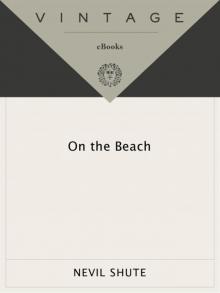 On the Beach
On the Beach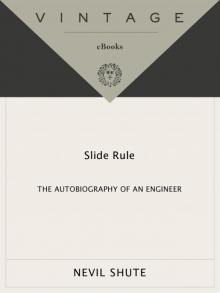 Slide Rule
Slide Rule A Town Like Alice
A Town Like Alice The Far Country
The Far Country Pied Piper
Pied Piper Round the Bend
Round the Bend An Old Captivity
An Old Captivity Mysterious Aviator
Mysterious Aviator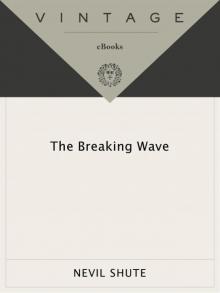 The Breaking Wave
The Breaking Wave Marazan
Marazan Lonely Road
Lonely Road Pastoral
Pastoral No Highway
No Highway Stephen Morris and Pilotage
Stephen Morris and Pilotage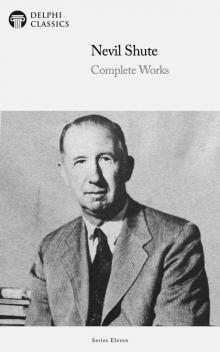 Complete Works of Nevil Shute
Complete Works of Nevil Shute Most Secret
Most Secret Beyond the Black Stump
Beyond the Black Stump The Rainbow and the Rose
The Rainbow and the Rose The Chequer Board
The Chequer Board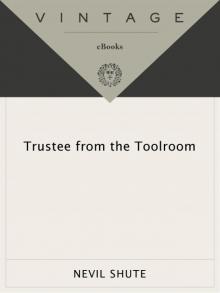 Trustee From the Toolroom
Trustee From the Toolroom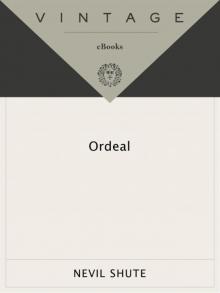 Ordeal
Ordeal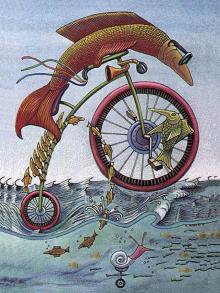 Stephen Morris
Stephen Morris